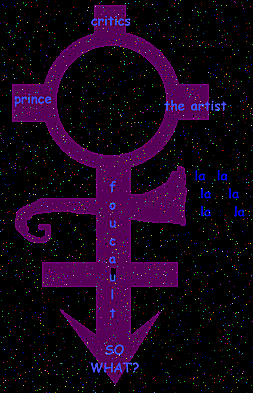
artistprince lyrics foucault main overview
|

Many interviews are stored on-line at The Vault, an archive of
interviews, articles, and reviews.
"There's nothing a critic can tell me that I can learn from, . . . If
they were musicians, maybe. But I hate reading about what some guy sitting at a desk
thinks about me. You know, "He's back and he's black, " or "He's back and he's bad."
Prince and  treat interviews with the same care that they
treat their songs. In each case, the interview is a crafted piece of work. treat interviews with the same care that they
treat their songs. In each case, the interview is a crafted piece of work.
-
He wanted to break his silence. I received the call summoning me to his presence at
Wembley Arena where is about to premiere his Gold Experience show.
On arrival I am told that neither tape-recording nor note-taking will be allowed during the
interview. The reasoning being that if the wee man says anything untoward he can always
claim to bhave been misquoted. When I reach his dressing room an unsmiling aide takes
my bag and gives me the kind of thoroughly impertinent bodysearch one associates with
catching a flight to the Middle East.
Once he is satisfied that I'm not wired for sound, carrying a portable phone or a loaded
revolver, I am introduced to the star who has been watching this ridiculous scenario with
a look of mild amusement but no apparent embarrassment.
-
An agreement made prior to this meeting stipulated, in no uncertain terms, that three rules
were to by obeyed if intercourse of any description were to occur: firstly, that no tape
recorder be used; secondly, that no notepad or pen be brought into the room; and thirdly,
and most strangely, that no questions be asked. He wanted to enjoy a half-hour
conversation unencumbered by the paraphernalia of nosy journalism.
-
The Artist had walked out of two interviews, one with Asian music channel VTV, and the
other with Sydney's Keith Williams from 2DAY FM. Keith got to ask only two questions
before The Artist decided he didn't like the sound of his voice. He walked out and his
minder seized the tape. The Artist then banned all electronic media. It seems that he
doesn't like his voice or image to be recorded.
One recurrent claim about Prince is that he was a very difficult person to interview--as
indicated above. He allowed only four or five interviews during the eighties (the height
of his popularity). Accessibility is a bit easier with  since he is more involved in the promotion of his
material. However, the conditions are still very rigid. since he is more involved in the promotion of his
material. However, the conditions are still very rigid.  has
conducted interviews more via fax and email than in face to face situations. When he is
willing to be interviewed, he makes all of the calls and all of the arrangements.
Everything, from who the interviewer is to how the final piece can look is under his
control. Photo ops are very short (he prefers to give out his own photos rather than
having them taken); interviewers are allowed no recording devices; and questions cannot
be personal. has
conducted interviews more via fax and email than in face to face situations. When he is
willing to be interviewed, he makes all of the calls and all of the arrangements.
Everything, from who the interviewer is to how the final piece can look is under his
control. Photo ops are very short (he prefers to give out his own photos rather than
having them taken); interviewers are allowed no recording devices; and questions cannot
be personal.
-
The situation, in fact, almost seems calculated to make the would-be interviewer feel like
an irrelevant intruder upon more serious business.
-
Prince's agreement to be interviewed took MTV so suddenly that the staff at the cable
network were unable to arrange to conduct the interview in person. Consequently, the
Music News staff resorted to simply providing a list of questions to be read to Prince by
his manager and answered by Prince on videotape. . . . Unfortunately, in many cases, he
didn't answer the questions posed, as you'll see. Although Prince is very good at many
things, his inexperience with interviews shows greatly.
-
Finally, there's one more philosophy unchanged with the years. "I play music," Prince has
said. "I make records. I make movies. I don't do interviews."
So, what are we doing? "We're just talking," he says. Hence, his decision not to be taped
or allow notes to be taken or even a pad of questions to be brought out. That would
inhibit him, he says; that would mean doing the thing that he just doesn't do.
Criticism seems to go both ways. Many people feel that his "excessive" control over his
image, words, and sounds has backfired and made him the target of ridicule or has led to
the media not taking him seriously. Consider, for example, this claim:
-
When he goes on The Today Show, the first thing Bryant Gumbel tells his viewers is that
the Artist was known to his high school friends as Skippy. One cringed with sympathy
for the Ex-Prince, who seems fated to be called to carpet again and again for the sins of
eccentricity. Of course, it's also true that he is the architect of his image. If he got burned
by the press, the match was lit in his hands.
Still through this relationship with the media,  continues to forge
not only what is talked about, but how it can be said and what can be used. This type of
constant attempt at control does influence how he is classified as an author.
Even as he puts himself beyond the media's reach, he obsessively
monitors everything that's written about him. continues to forge
not only what is talked about, but how it can be said and what can be used. This type of
constant attempt at control does influence how he is classified as an author.
Even as he puts himself beyond the media's reach, he obsessively
monitors everything that's written about him.
|


 treat interviews with the same care that they
treat their songs. In each case, the interview is a crafted piece of work.
treat interviews with the same care that they
treat their songs. In each case, the interview is a crafted piece of work.
 since he is more involved in the promotion of his
material. However, the conditions are still very rigid.
since he is more involved in the promotion of his
material. However, the conditions are still very rigid.  has
conducted interviews more via fax and email than in face to face situations. When he is
willing to be interviewed, he makes all of the calls and all of the arrangements.
Everything, from who the interviewer is to how the final piece can look is under his
control. Photo ops are very short (he prefers to give out his own photos rather than
having them taken); interviewers are allowed no recording devices; and questions cannot
be personal.
has
conducted interviews more via fax and email than in face to face situations. When he is
willing to be interviewed, he makes all of the calls and all of the arrangements.
Everything, from who the interviewer is to how the final piece can look is under his
control. Photo ops are very short (he prefers to give out his own photos rather than
having them taken); interviewers are allowed no recording devices; and questions cannot
be personal.
 continues to forge
not only what is talked about, but how it can be said and what can be used. This type of
constant attempt at control does influence how he is classified as an author.
Even as he puts himself beyond the media's reach, he obsessively
monitors everything that's written about him.
continues to forge
not only what is talked about, but how it can be said and what can be used. This type of
constant attempt at control does influence how he is classified as an author.
Even as he puts himself beyond the media's reach, he obsessively
monitors everything that's written about him.